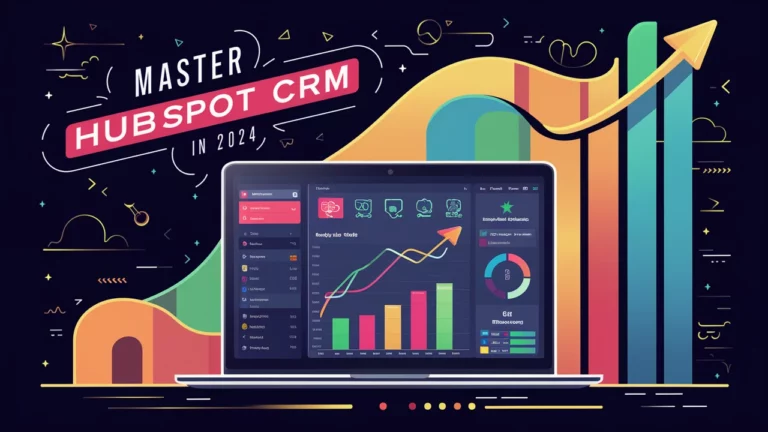Best AI Customer Support Software for Customer Engagement in 2024

AI has become a game-changer in the ever-changing world of customer support. It is transforming how businesses communicate with their clients by:
- Reducing response times: AI-powered systems can quickly analyze customer inquiries and provide instant solutions, minimizing wait times.
- Delivering personalized experiences: AI can help businesses understand customer preferences and tailor their interactions accordingly.
As we enter 2024, engaging with customers effectively cannot be emphasized enough. When customers are engaged, they are satisfied, loyal, and more likely to promote your brand.
Our audience supports Ahcrypto. When you click on the links on our site, we may earn an affiliate commission at no extra cost to you. Learn More.
The Role of AI in Customer Support
AI-powered tools are essential in this transformation. They use advanced technologies such as Natural Language Processing (NLP) and Machine Learning (ML) to provide intelligent solutions that:
- Anticipate customer needs
- Streamline support processes
By incorporating AI into your customer service strategy, you are embracing a future where interactions are:
- Seamless
- Efficient
- Tailored to individual preferences
In this article, we will explore how these innovations are shaping the future of customer engagement and discuss the best AI customer support software options available in 2024.
Understanding AI Customer Support Software

Definition of AI Customer Support Software
AI customer support refers to using artificial intelligence technology to enhance and automate various aspects of customer service. This can include answering queries, resolving issues, and providing personalized recommendations. The primary objective is to deliver a seamless experience that meets customer needs efficiently and effectively.
The Evolution of Customer Service with AI
Customer service has come a long way, from traditional call centers to sophisticated AI-driven solutions. Initially, customer support relied heavily on human agents who handled inquiries manually, often leading to long wait times and inconsistent service quality.
- First Wave: Introduction of basic automation tools like Interactive Voice Response (IVR) systems.
- Second Wave: Emergence of chatbots capable of handling simple queries.
- Third Wave: Advanced AI applications, including Natural Language Processing (NLP) and Machine Learning (ML), enabling more complex interactions and predictive analytics.
Today, AI technology revolutionizes customer service by providing faster response times, reducing operational costs, and offering 24/7 support.
Key Components of AI Customer Support Software Solutions
To understand the effectiveness of AI in customer support, it’s essential to delve into its core components:
- Natural Language Processing (NLP) enables machines to understand and interpret human language. NLP systems can provide accurate responses in real-time by analyzing text or speech inputs. For example, chatbots use NLP to understand customer queries and offer relevant solutions.
- Machine Learning (ML): ML algorithms allow systems to learn from past interactions and improve over time. This capability helps predict customer behavior, personalize responses, and automate repetitive tasks. For instance, an ML-powered system can analyze previous support tickets to suggest the best course of action for new issues.
These components are integral to the Best AI Customer Support Software for Customer Engagement in 2024, driving innovations that enhance user experiences while streamlining business operations.
Benefits and Challenges of Implementing AI in Customer Service
How AI Reduces Response Times and Improves Accuracy
AI customer support tools significantly decrease response times by automating repetitive tasks and providing quick solutions. For example, chatbots can simultaneously handle a high volume of queries, answering common questions instantly. This frees up human agents to deal with more complex issues and ensures that customers are not left waiting.
Improved accuracy is another key benefit. AI systems equipped with Natural Language Processing (NLP) and Machine Learning (ML) can precisely understand and interpret customer inquiries. These systems learn from past interactions by analyzing large datasets to provide more accurate responses. This capability helps reduce errors and deliver consistent service.
The Impact of Personalized Experiences on Customer Satisfaction
Personalized experiences are crucial in today’s competitive market. AI excels at delivering such experiences by analyzing customer data to tailor responses and recommendations. For instance, AI-driven systems can recognize returning customers and recall their previous interactions, preferences, and purchase history. This level of personalization makes customers feel valued and understood, significantly boosting their satisfaction.
A practical example is an e-commerce platform using AI to suggest products based on a customer’s browsing history and past purchases. These tailored recommendations can enhance the shopping experience, encouraging repeat business.
Common Challenges Faced During Implementation
Implementing AI in customer service is not without its challenges:
- Training Datasets: One primary hurdle is the need for extensive, high-quality training datasets to train Large Language Models (LLMs). AI systems may struggle to provide accurate answers or understand nuanced customer queries without comprehensive data.
- IT Support: Robust IT infrastructure is essential for deploying and maintaining AI tools. Integrating these advanced systems with existing platforms can be complex and require substantial technical expertise.
- Resistance to Change: Organizational resistance can impede the adoption of AI. Employees may fear job displacement or struggle to adapt to new technologies. Effective change management strategies and transparent communication are vital to address these concerns.
Incorporating AI into customer service can revolutionize the way businesses interact with customers, offering faster responses, higher accuracy, and personalized experiences. However, it also presents some implementation challenges that require careful planning and execution. Such transformation is not just theoretical; it’s already happening, as companies like Zendesk are successfully implementing AI in their customer service strategies.
1. Help Scout: Unleashing Team Collaboration with Intelligent Email Management Tools
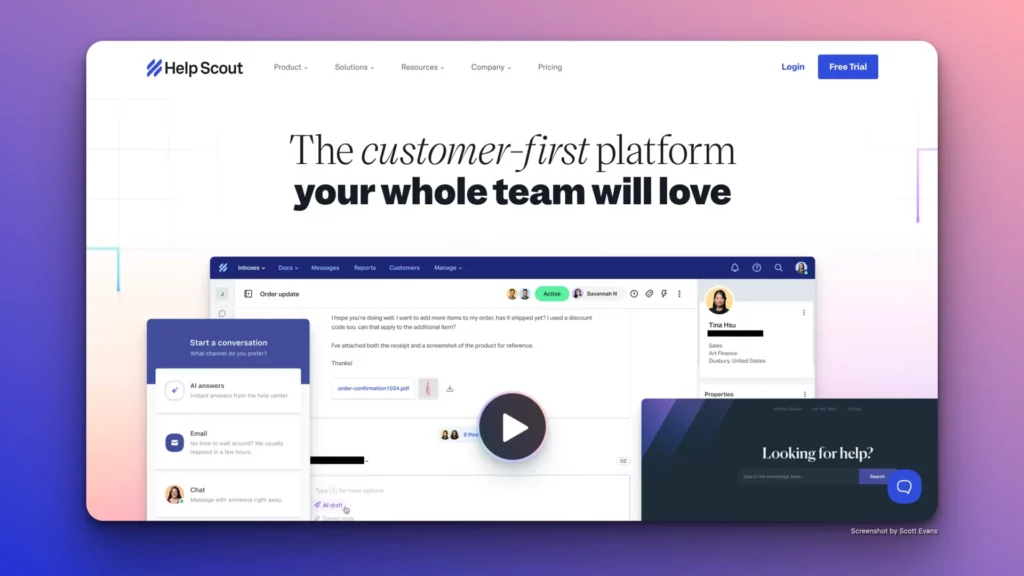
Help Scout has carved a niche for itself in customer support by offering a suite of tools designed to streamline and enhance team collaboration. This AI-powered software is particularly notable for its intelligent email management capabilities, making it one of the best AI tools for customer support software.
Features and Benefits for Team Collaboration and Email Management
1. Centralized Inbox
Help Scout’s centralized inbox serves as a hub where all customer interactions are stored. This feature ensures that every team member can access the same information, leading to seamless collaboration and eliminating the risk of duplicate responses.
- Unified View: All emails, chats, and messages in one place.
- Tagging and Assigning: Easily tag team members or assign conversations to ensure accountability.
2. Intelligent Email Automation
The software’s AI-driven email automation tools help reduce manual tasks, allowing support teams to focus on more complex issues.
- Automated Workflows: Set up rules to automate repetitive tasks such as sorting emails or sending follow-up messages.
- Canned Responses: Use pre-written replies to common queries, ensuring consistent and quick responses.
3. Real-Time Collaboration
Help Scout excels in facilitating real-time collaboration among team members. Its internal notes feature allows team members to communicate directly within an email thread without notifying the customer.
- Internal Notes: Add private comments that only your team can see.
- Collision Detection: Alerts when multiple team members are responding to the same customer query.
4. Reporting and Analytics
Understanding performance metrics is crucial for any support team aiming to improve its services. Help Scout offers robust reporting tools that provide insights into various aspects of team performance.
- Customer Satisfaction Reports: Measure how happy customers are with your service.
- Team Performance Metrics: Track response times, resolution rates, and other critical KPIs.
5. Integration Capabilities
Help Scout integrates seamlessly with numerous third-party applications, enhancing its functionality and allowing it to fit effortlessly into your existing tech stack.
- CRM Integration: Syncs with popular CRM platforms like Salesforce and HubSpot.
- Productivity Tools: Works well with Slack, Trello, and other productivity apps for enhanced workflow management.
6. Proactive Messaging
One of the standout features is proactive messaging through micro surveys, which allows teams to engage customers before they even reach out for support.
- Microsurveys: Short surveys can be triggered based on user behavior.
- Proactive Outreach: Send helpful tips or product updates proactively based on customer activity.
By harnessing these features, Help Scout stands out as a powerful tool for enhancing both individual productivity and overall team efficiency in customer support environments. The ability to centralize communication, automate routine tasks, foster real-time collaboration, generate insightful reports, integrate with essential tools, and engage proactively makes it a top contender in AI customer support software for 2024.
2. Yuma AI Ticket Assistant: Empowering Shopify Merchants with Autonomous Task Handling Capabilities

Yuma AI Ticket Assistant stands out as one of the best AI tools for customer support software, particularly tailored for Shopify merchants. Its primary strength lies in autonomous task handling, which is a game-changer for e-commerce businesses that need to manage a high volume of customer inquiries efficiently.
Key Features and Benefits:
- Automated Ticket Management: Yuma excels at sorting, prioritizing, and responding to customer tickets autonomously. By leveraging advanced machine learning algorithms, it ensures that common queries are handled without human intervention, freeing up valuable time for support teams.
- Seamless Shopify Integration: Specifically designed for Shopify users, Yuma integrates effortlessly with the platform, making it easy to pull order details, track shipments, and provide accurate responses based on real-time data.
- Personalized Customer Responses: Utilizing natural language processing (NLP), Yuma crafts personalized responses that align with the brand’s tone and style. This creates a more engaging and satisfactory interaction for customers.
- Scalability: As your business grows, Yuma scales alongside it. Whether you’re handling dozens or thousands of inquiries daily, the assistant adapts to ensure consistent performance.
“Yuma AI Ticket Assistant has revolutionized how we handle support. Our response times have dramatically decreased, and our customers are happier than ever.” – A satisfied Shopify merchant
This blend of efficiency and personalization makes Yuma an invaluable asset in the realm of AI Customer Support software.
3. Freshdesk: Delivering Seamless Omnichannel Support Through Freddy’s AI-Powered Features

Managing customer interactions across different platforms can be challenging, but with Freshdesk, it becomes effortless. Freshdesk stands out as one of the top AI tools for customer support software by offering excellent omnichannel support features through its intelligent assistant, Freddy AI.
Omnichannel Support Capabilities
Freshdesk seamlessly integrates various communication channels, including:
- Phone
- Chat
- Social Media
This ensures customers receive consistent and efficient support regardless of their preferred contact method. A unified dashboard allows support teams to manage these interactions effortlessly, enhancing response times and accuracy.
Freddy AI Features
Freddy AI, the brain behind Freshdesk’s smart solutions, offers:
- Automated Ticket Routing: Ensures each query is directed to the right agent or department based on context and urgency.
- Predictive Insights: Helps agents anticipate customer needs by analyzing previous interactions and suggesting relevant solutions.
- Chatbots and Virtual Assistants: These tools handle routine queries and provide instant responses, freeing up human agents for more complex issues.
Freddy AI’s capabilities extend beyond mere automation; it personalizes each interaction by understanding the customer’s history and preferences. This level of personalization boosts customer satisfaction and loyalty.
When evaluating criteria for selecting the best software in AI Customer Support, Freshdesk’s combination of omnichannel integration and powerful AI features makes it a compelling choice.
4. Tidio: Transforming Customer Interactions with Live Chat and Virtual Assistants
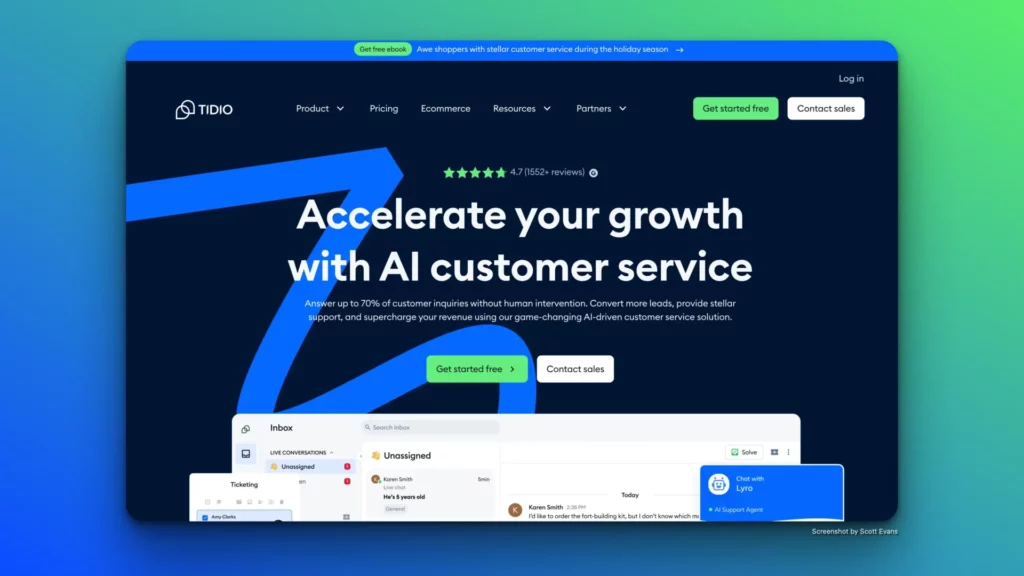
Tidio is one of the best AI tools for customer support software in 2024, thanks to its focus on real-time interaction. With its advanced live chat feature, Tidio enables businesses to have immediate and personalized conversations with their customers.
Key Features:
- Live Chat: Tidio’s live chat interface is intuitive and user-friendly, enabling businesses to engage with website visitors in real-time. This feature ensures that customer queries are addressed promptly, enhancing customer satisfaction and reducing response times.
- Virtual Assistants: The integration of AI-powered virtual assistants allows Tidio to handle a wide range of customer interactions autonomously. These virtual assistants can manage common inquiries, provide product recommendations, and assist with order tracking, freeing up human agents to tackle more complex issues.
- Scalability: Tidio’s platform is designed to grow with your business. Whether you’re a small startup or an established enterprise, Tidio offers scalable solutions that adapt to your evolving needs.
“Tidio has transformed how we interact with our customers, offering immediate support through its seamless live chat and intelligent virtual assistants.” – A satisfied Tidio user
By combining these powerful features, Tidio ensures that businesses can maintain high levels of customer engagement and foster stronger relationships through timely and effective communication. Whether you’re looking for real-time interaction tools or advanced AI capabilities, Tidio provides a comprehensive solution that meets the criteria for selecting the best software in today’s competitive market.
5. Qualaroo: Using Sentiment Analysis for Actionable Feedback Collection
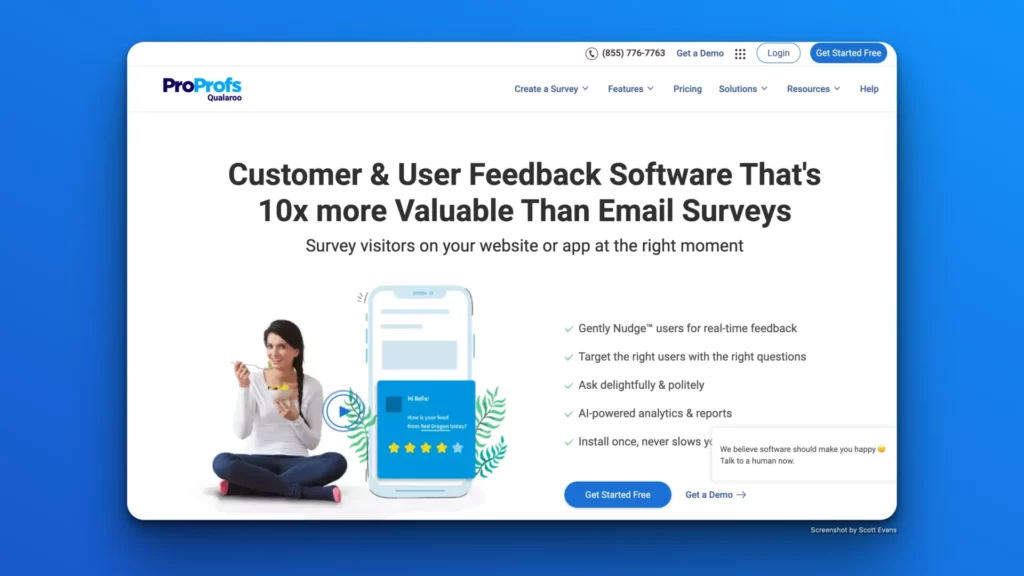
Qualaroo stands out among AI Customer Support software tools for its powerful sentiment analysis and feedback collection features. This tool is designed to capture customer sentiments in real time, allowing businesses to understand their customers’ thoughts and feelings more intimately.
Key Features of Qualaroo:
- Sentiment Analysis: Using advanced natural language processing (NLP) algorithms, Qualaroo analyzes customer feedback to determine the overall sentiment. This helps businesses quickly gauge customer satisfaction and identify areas requiring immediate attention.
- Feedback Collection: Qualaroo’s unobtrusive survey widgets are perfect for gathering insights without disrupting the user experience. These surveys can be customized and targeted to specific user segments, ensuring relevant and actionable data collection.
- Actionable Insights: The platform converts raw data into visual reports that highlight trends and patterns. This makes it easier to pinpoint common issues and opportunities for improvement.
For those looking for the best AI tools for customer support software, Qualaroo offers an excellent balance of features and scalability. It seamlessly integrates with other tools like Help Scout, ensuring a unified approach to customer engagement. Qualaroo’s insights can help elevate your customer support strategy to new heights, whether you’re a small business or a large enterprise.
Qualaroo not only excels in collecting valuable customer feedback but also provides the analytical depth needed to transform that feedback into meaningful action plans. By leveraging this tool, businesses can stay ahead in understanding their customers’ needs, ultimately driving better engagement and satisfaction.
6. HubSpot: Integrating CRM Functionality with Benefits for Sales and Marketing Teams
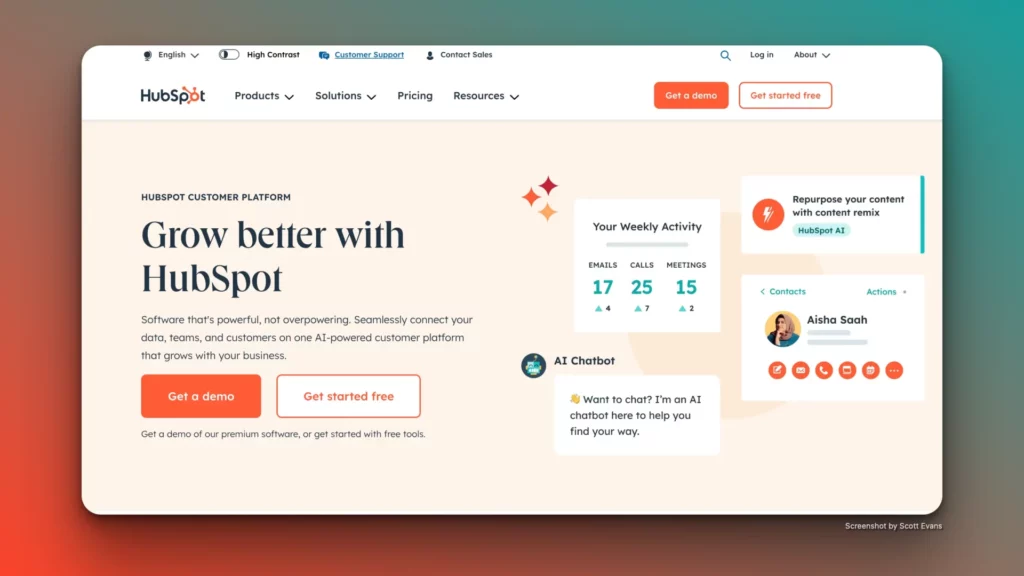
When discussing best AI tools for customer support software, HubSpot stands out due to its seamless integration of CRM functionality. This integration offers numerous benefits, particularly for sales and marketing teams, making it a top contender in the realm of AI customer support software.
Key Features:
- Unified CRM System: HubSpot’s CRM system unifies all customer interactions across various channels, ensuring that sales and marketing teams have access to comprehensive customer data. This leads to more informed decision-making and personalized customer engagement.
- Automation Capabilities: With AI-driven automation, repetitive tasks such as email follow-ups and lead scoring are handled efficiently. This gives teams more time to focus on strategic initiatives rather than mundane activities.
- Personalized Marketing Campaigns: Leveraging AI, HubSpot allows for the creation of highly tailored marketing campaigns. Analyzing customer behavior and preferences ensures that marketing efforts resonate with the target audience, increasing conversion rates.
- Scalability: As businesses grow, so do their needs. HubSpot’s scalable solutions can adapt to increasing volumes of customer data and interactions without compromising performance.
- Enhanced Collaboration: The platform promotes collaboration between sales and marketing teams through shared dashboards and analytics. This fosters a cohesive approach to customer engagement, ensuring consistency in communication and strategy.
Integrating these features into an AI-powered environment equips businesses with the tools needed to deliver exceptional customer service while simultaneously driving sales and marketing success. For those evaluating criteria for selecting the best software, considering features like scalability, ease of use, and integration capabilities is crucial—and HubSpot checks all these boxes effectively.
7. Balto: Empowering Call Centers with Real-Time Guidance Solutions
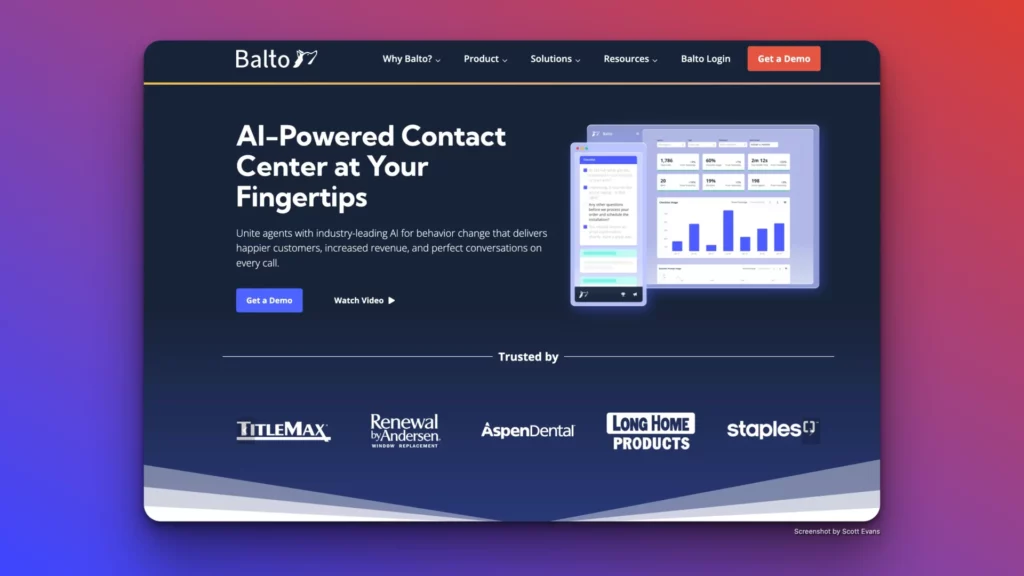
Navigating the high-pressure environment of call centers demands more than just patience and a pleasant voice. Enter Balto, a game-changer in the world of AI customer support software, especially for call centers.
Balto specializes in providing real-time guidance, ensuring that agents have the right information at their fingertips during customer interactions. This feature is crucial for maintaining high customer service standards and reducing the time spent on each call without sacrificing quality.
Key features include:
- Live Call Transcription: Converts spoken words into text instantly, enabling supervisors to monitor conversations in real-time and provide immediate feedback.
- Dynamic Prompting: Offers contextual prompts based on the conversation flow, helping agents respond accurately and effectively.
- Performance Metrics: Tracks key performance indicators (KPIs) such as average call time, resolution rate, and customer satisfaction scores, providing valuable insights for continuous improvement.
For organizations prioritizing the best AI tools for customer support software, Balto stands out due to its scalability and feature-rich platform. The ability to offer real-time solutions not only enhances agent performance but also significantly improves the overall customer experience.
By integrating these advanced features, Balto ensures that call centers are equipped to handle complex queries efficiently, making it a must-have tool in the arsenal of modern customer support strategies.
8. Kustomer: Creating Unified Views Across Channels with Conversational Assistant Capabilities
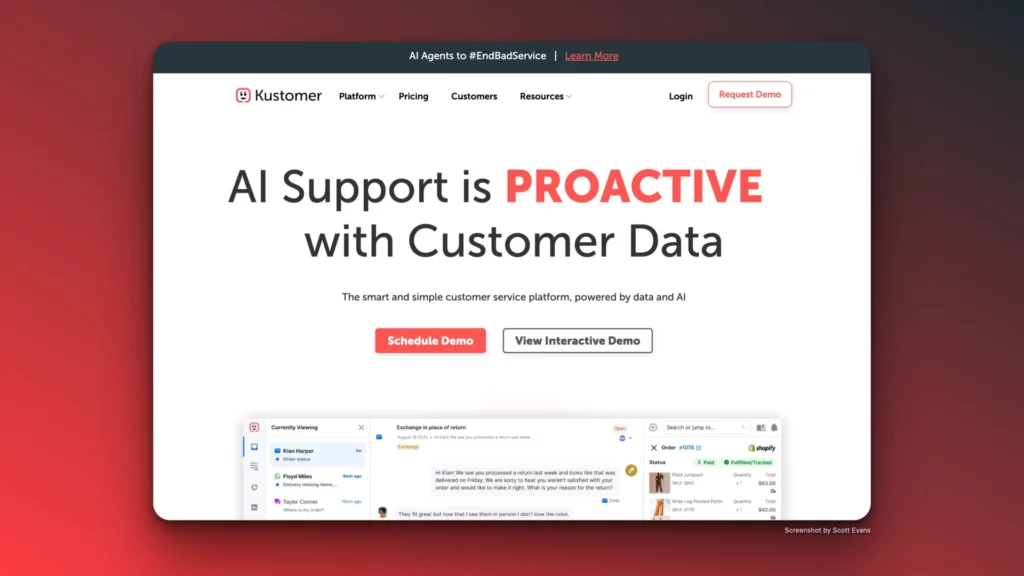
Kustomer stands out among the best AI tools for customer support software by providing a holistic approach to managing customer interactions. This platform excels in creating unified views across channels, ensuring that every customer touchpoint is seamlessly integrated.
Key Features:
- Conversational Assistant Capabilities: Kustomer’s AI-driven assistant streamlines communication, providing real-time responses and automating routine tasks. This enables support agents to focus on more complex issues.
- Omnichannel Support: By integrating various communication channels such as email, chat, social media, and phone calls into a single interface, Kustomer ensures that all customer interactions are coherent and contextually relevant.
- Customer Timeline: The platform offers a comprehensive timeline for each customer, displaying past interactions and purchases, which aids in delivering personalized support.
Benefits:
- Enhanced Agent Productivity: With AI handling repetitive queries, agents can allocate their time more effectively to resolve critical issues.
- Improved Customer Experience: Unified views and quick access to complete customer histories result in more efficient and satisfying interactions.
In selecting the best AI customer support software tools like Kustomer, consider factors such as features, scalability, and how well the tool integrates with your existing systems. With its robust capabilities, Kustomer sets a high standard for delivering exceptional customer service through AI.
9. Zendesk: Streamlining Centralized Ticket Management through Agent Assist Tools

When it comes to centralized ticket management, Zendesk is a standout in the realm of AI customer support tools. Designed for businesses that handle high volumes of customer inquiries, Zendesk’s platform offers a seamless way to manage and organize support tickets from multiple channels into one unified system.
Key Features:
- Agent Assist Tools: Zendesk incorporates intelligent agent assist features that provide real-time suggestions, automated responses, and knowledge base recommendations. These tools help agents resolve issues more efficiently and accurately.
- Centralized Dashboard: The centralized dashboard provides a comprehensive view of all customer interactions. This allows support teams to track, prioritize, and manage tickets effectively without missing any critical details.
- Automation Capabilities: Automation plays a crucial role in Zendesk’s functionality. The platform uses AI to automate repetitive tasks like categorizing tickets and routing them to the appropriate departments or agents, significantly reducing response times.
- Scalability: As businesses grow, Zendesk scales effortlessly to meet increasing demands, making it one of the best AI tools for customer support software.
Zendesk’s robust features make it an essential tool for companies looking to enhance their customer service operations through AI-powered solutions. The combination of centralized ticket management and smart agent assist tools ensures that every customer receives prompt and accurate support, boosting overall satisfaction levels.
Best Practices for Successful Implementation of AI Customer Support Software Solutions
Integrating AI tools into existing processes can seem daunting, but with the right approach, it can significantly enhance customer experience and streamline operations. Here are some key practices to ensure successful implementation:
1. Start with Clear Objectives
Define what you aim to achieve with AI integration. Whether it’s reducing response times, improving accuracy, or providing personalized experiences, having clear goals will guide the implementation process and help measure success.
2. Choose the Right Tools
Selecting the appropriate AI tools tailored to your business needs is crucial. Evaluate features such as natural language processing (NLP), machine learning (ML) capabilities, and compatibility with your existing systems.
3. Integrate Seamlessly
Ensuring smooth integration of AI tools into existing workflows minimizes disruptions and maximizes efficiency. Consider the following steps:
- Conduct a System Audit: Understand current processes and identify where AI can add value.
- Collaborate with IT Teams: Work closely with IT departments to address any technical challenges.
- Pilot Programs: Run pilot tests to iron out potential issues before full-scale deployment.
4. Train Customer Service Teams
Training is pivotal in harnessing the full potential of AI customer support software solutions:
- Comprehensive Training Programs: Offer detailed training sessions on how to use new AI tools effectively.
- Hands-On Practice: Provide opportunities for customer service representatives to practice using AI tools in simulated environments.
- Ongoing Support: Establish a support system for continuous learning and troubleshooting.
5. Monitor and Optimize
Regular monitoring ensures that AI tools are performing as expected:
- Performance Metrics: Track key performance indicators (KPIs) such as response times, customer satisfaction scores, and resolution rates.
- Feedback Loop: Collect feedback from both customers and service reps to identify areas for improvement.
- Iterative Improvements: Make data-driven adjustments to continually refine AI functionalities.
6. Prioritize Data Security
With the increasing reliance on AI, safeguarding customer data is paramount:
- Implement Robust Security Measures: Use encryption, access controls, and regular security audits.
- Compliance Adherence: Ensure all practices align with regulations like GDPR and CCPA.
Embracing these best practices can pave the way for effective AI integration in customer support. When done right, AI not only augments human capabilities but also elevates overall customer engagement to new heights.
Using Data Analytics to Enhance Customer Support with AI

Data analysis in customer service is a game-changer. By leveraging the power of data analytics, businesses can transform raw information into actionable insights that directly impact customer satisfaction and loyalty.
Understanding User Behavior
One of the primary benefits of data analysis in customer service is understanding user behavior. Through comprehensive data collection, businesses can:
- Track Interaction Patterns: Analyze chat logs, email inquiries, and call transcripts to identify common issues or questions customers face.
- Segment Customer Base: Break down the customer base into distinct groups based on behaviors, preferences, and demographics to offer more personalized support.
- Predict Customer Needs: Utilize predictive analytics to anticipate customer needs before they even contact support, allowing for proactive engagement.
Enhancing AI-Powered Tools
AI-powered tools thrive on data. The more data these tools access, the more refined their algorithms become. Here’s how data analytics plays a crucial role:
- Training AI Models: High-quality datasets are essential for training machine learning models. The richer the dataset, the better the AI understands and resolves queries.
- Improving Accuracy: Continuous data analysis helps in fine-tuning AI algorithms, leading to improved accuracy in responses and issue resolution.
- Personalization: AI can provide highly personalized responses that resonate with individual customers by analyzing past interactions and behaviors.
Real-Time Insights
Real-time insights are invaluable for enhancing customer support operations:
- Monitoring Performance: Track key performance indicators (KPIs) such as response times, resolution rates, and customer satisfaction scores in real time.
- Identifying Trends: Spot emerging trends quickly to address potential issues before they escalate.
- Resource Allocation: Optimize resource allocation based on real-time demand patterns, ensuring that support teams are neither overburdened nor underutilized.
Success Stories
Several companies have successfully integrated data analytics into their customer support systems:
“Zendesk utilizes robust data analytics to provide detailed insights into customer interactions. This allows them to deliver tailored support experiences that significantly boost customer satisfaction.”
“HubSpot’s CRM integration enables seamless tracking of customer journeys across multiple touchpoints, providing sales and marketing teams with a unified view of each customer.”
By using data analytics in customer service, businesses can improve their AI capabilities and gain a better understanding of their customers’ needs and behaviors. This leads to more effective support operations and higher levels of customer engagement and loyalty.
Future Trends in AI Customer Support Software
The world of AI customer support software is changing rapidly. Businesses are always looking for new and creative ways to improve their customer service and make support processes more efficient. Here are some important trends to keep an eye on in 2024:
1. Conversational Knowledge Bases
Conversational knowledge bases are set to change how customers interact with support systems. Using natural language processing (NLP) and machine learning (ML), these advanced systems can:
- Provide instant, context-aware answers: Customers receive precise information tailored to their specific queries, reducing wait times and improving satisfaction.
- Learn from interactions: Continuously improve by analyzing user interactions and feedback, ensuring that responses become more accurate over time.
- Integrate seamlessly with chatbots: Enhance the capabilities of chatbots by providing them access to a vast repository of knowledge, making them more efficient and effective.
2. Real-Time Guidance
Real-time guidance tools are empowering customer support agents like never before. These AI-driven solutions offer several benefits:
- Immediate assistance: Agents receive on-the-fly suggestions and solutions during live interactions, helping them resolve issues swiftly.
- Enhanced performance: By guiding agents through complex scenarios, these tools minimize errors and boost overall efficiency.
- Consistent service quality: Ensures that every customer receives high-quality support regardless of the agent’s experience level.
3. AI Customer Support Software Enhancements
AI customer support software is not just about automating responses; it’s about creating a holistic improvement in the support ecosystem. Some anticipated enhancements include:
- Hyper-personalization: Using AI to tailor every interaction based on individual customer data, preferences, and history.
- Predictive analytics: Anticipating customer needs and proactively addressing potential issues before they escalate.
- Voice recognition technology: Integrating voice-based commands and responses into support systems, offering a hands-free and seamless experience.
These trends highlight the transformative power of AI in reshaping customer support. Organizations that embrace these innovations will likely find themselves at the forefront of delivering exceptional customer experiences in 2024 and beyond.
FAQs (Frequently Asked Questions)

Scott Evans
Hey there, I’m Scott Evans, your friendly guide at AhCrypto! I’m all about breaking down complex SaaS, AI, and tech topics into digestible insights. With me, you’re not just keeping up with the tech world; you’re staying ahead of the curve. Ready to dive into this exciting journey? Let’s get started!





